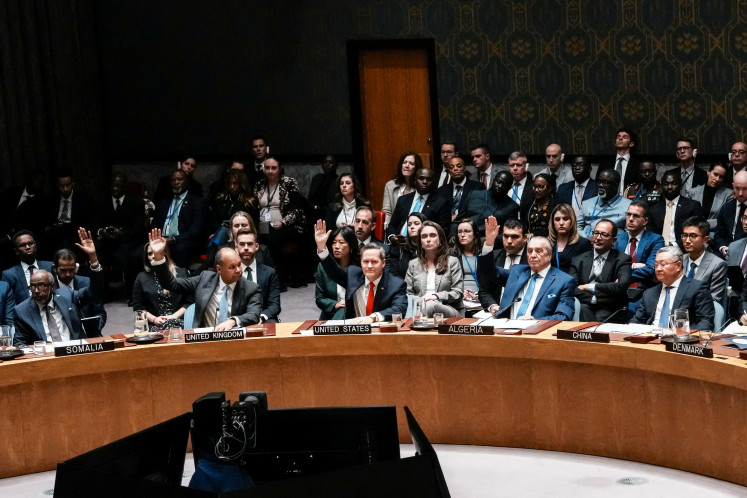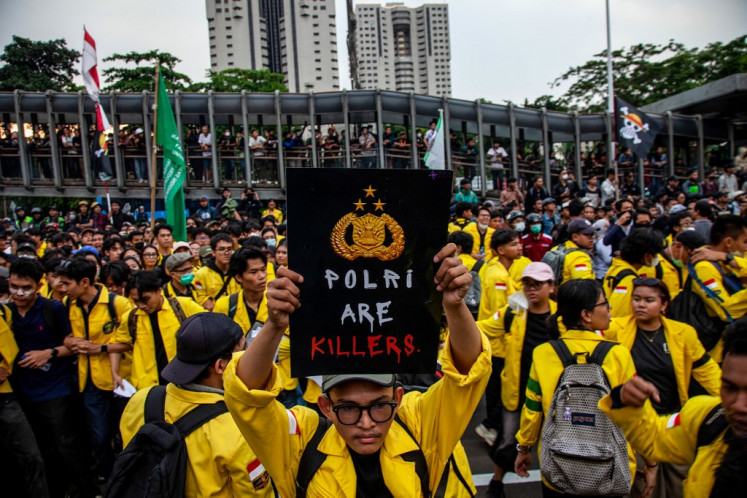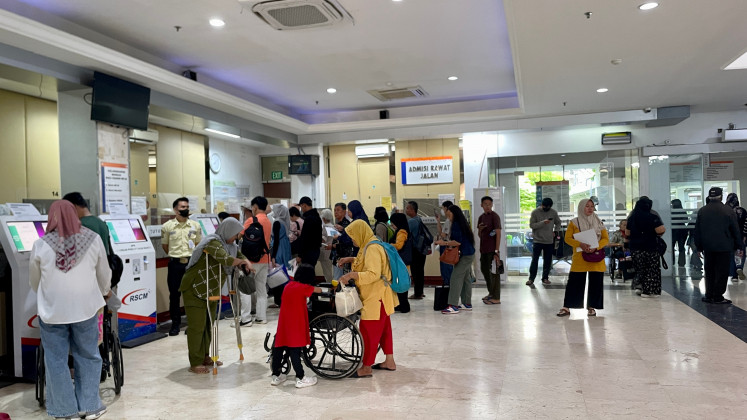Popular Reads
Top Results
Can't find what you're looking for?
View all search resultsPopular Reads
Top Results
Can't find what you're looking for?
View all search resultsPresident invests in TNI, limits oversight
During his 10 years leading the government, outgoing President Susilo Bambang Yudhoyono has developed the Indonesian Military (TNI) by increasing its budget and endorsing regulations that strengthen its authority, but has done nothing to make sure the military becomes more accountable to higher powers
Change text size
Gift Premium Articles
to Anyone
D
uring his 10 years leading the government, outgoing President Susilo Bambang Yudhoyono has developed the Indonesian Military (TNI) by increasing its budget and endorsing regulations that strengthen its authority, but has done nothing to make sure the military becomes more accountable to higher powers.
Yudhoyono's lack of concrete action to reform the TNI has protected the institution from law enforcement efforts, nurtured its culture of impunity and, in contrast to other state institutions, left it untouched by the Corruption Eradication Commission (KPK).
Unlike his obvious attempt to improve the TNI through soaring funding that reached Rp 95 trillion (US$78.4 billion) in the proposed 2015 state budget, the largest amount given to any state institution, Yudhoyono had apparently ignored plans to amend the 1997 Law on Military Tribunals throughout his leadership terms.
Critics believe that the amendment would lay the foundation for a progressive change within the TNI as it would allow external oversight to enforce accountability and transparency.
In 2008, after three years of intense meetings with military officials, the House of Representatives was poised to pass an amendment of the law in order to allow civilian courts to try soldiers involved in non-military offenses.
Yudhoyono had voiced support for the then lawmakers' plan to include the long-awaited passage in the revision that could end military impunity and ensure transparency within the TNI, but he ended the discussions the next year, ahead of his second presidential election campaign, which critics saw as a move taken to secure a nod from the military for its support in the race.
Nothing was heard of the fate of the amendment until today, although reports of soldiers committing crimes continued to touch the nerves of the Indonesian public, especially last year when 12 members of the Army's Special Forces (Kopassus) brutally murdered four detainees at the Cebongan Penitentiary in Yogyakarta.
Apart from the atrocious Cebo-ngan prison attack, Jakarta-based human rights watchdog Imparsial noted that 92 cases of violence against civilians by soldiers had occurred all across the archipelago during Yudhoyono's terms in office from 2004 to 2014.
As long as the 1997 military tribunals law remains intact, the TNI will be able to keep dealing with the misconduct of soldiers as an internal affair.
'Reform within the military institution will never take place as long as the [military tribunals] law is maintained,' Wahyudi Djafar from the Institute for Policy Research and Advocacy (ELSAM) said recently.
'A lack of control over the TNI's enormous power will enable soldiers to take excessive measures in the name of state security,' he emphasized.
The amendment of the law was among a total of 25 regulations promoted for security sector reform that were included in the list of 247 bills for the 2009-2014 National Legislation Program (Prolegnas).
The government, as well as lawmakers, had instead endorsed laws on state intelligence and on social conflict management that were deemed contentious because of potential abuses of power, respectively by the National Intelligence Agency (BIN) over the criminalization of leaking intelligence information and state secrets to the public and the TNI over its interference in local political issues through the deployment of soldiers for resolving social conflicts by the consent of the President and the House.
And, in response to mounting concerns over soldier misconduct, the government and the House have recently enacted the Military Discipline Law, a compromise law that deals with discipline, but still through internal military courts.
The law dashed the expectation for transparency in punishing soldiers who are deemed to have breached discipline.
It has also exempted military personnel from being investigated by the KPK over any alleged misuse of the huge amount of state money granted to the organization. In 2012, the Defense Ministry was in the spotlight over alleged irregularities in the $470 million procurement of six Russian-made Sukhoi Su-30MKK fighter planes that might have caused $50 million in losses to the state, an allegation quickly denied by the government.
In addition to the lack of regulations endorsing transparency and accountability, the retention of the Army's territorial command (Koter) at the local level, which had previously been used by the New Order regime to spy on the public, also raised concerns over the involvement of the military in the country's politics, even following the abolishment of its then 'dual function' that allowed officers hold various political and economic positions all over the country.
'The military is prone to being misused for political interests when its structure is not reorganized,' said Al Araf from Imparsial.










